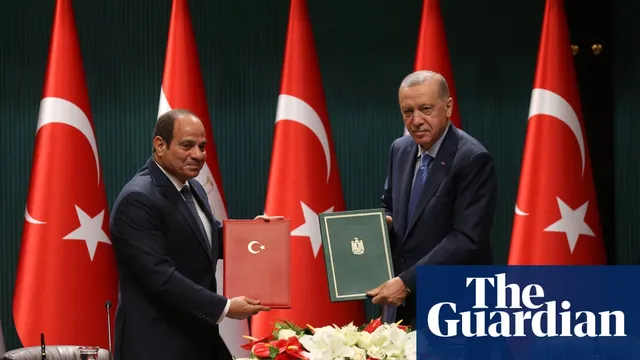
Libya crisis challenges Egypt and Turkey’s emerging alliance
2024-09-10 00:00- Egypt and Turkey's alliance is being tested by a political crisis in Libya linked to oil wealth control.
- The dismissal of central bank governor Sadiq al-Kabir has led to demands for his reinstatement and has caused economic instability.
- International calls for a consensus resolution highlight the urgent need to address Libya's divisions to prevent further collapse.
Express your sentiment!
Insights
A new alliance between Egypt and Turkey is facing its first significant challenge due to a political crisis in Libya, which is tied to the control of the country's oil wealth. The relationship between the two nations had been strained since the 2011 Arab Spring, particularly after Egypt's President Sisi ousted the Islamist leader Morsi, who was supported by Turkey's President Erdoğan. Recent diplomatic efforts included Sisi's visit to Ankara, signaling a potential thaw in relations. The immediate issue arises from the dismissal of Libya's central bank governor, Sadiq al-Kabir, who fled to Turkey fearing for his safety. His removal has sparked tensions, particularly as eastern Libya, which is backed by Egypt and other regional powers, demands his reinstatement. The central bank plays a crucial role in managing Libya's oil wealth and has significant foreign exchange reserves, making the situation economically sensitive. The political divide in Libya has persisted since Gaddafi's fall, with competing factions controlling different regions. The Tripoli-based government, led by Abdul Hamid Dabaiba, is accused of corruption and mismanagement, which has led to increased expenditures without corresponding revenues. This financial instability has resulted in the closure of oilfields and frozen transactions, further complicating the crisis. International actors, including the UN, are urging a consensus solution, potentially involving Kabir's interim return. The situation remains precarious, with the risk of Libya descending into a failed state, which would have significant implications for regional stability and migration issues.
Contexts
The Libya crisis has significant implications for Egypt and Turkey, as both nations navigate their emerging alliance amidst regional instability. Turkey's President Erdogan has called for Islamic unity against perceived threats, particularly from Israel, which reflects Turkey's broader strategy to strengthen ties with regional powers, including Egypt. This is crucial as both countries share concerns over security and stability in the region. The political landscape in Libya remains complex, with the influence of militia groups and traffickers complicating governance. The recent assassination of trafficker Abdalrahman al-Milad highlights the blurred lines between state authority and militia power, which has exacerbated the migrant crisis affecting Europe. This situation poses challenges for both Egypt and Turkey as they seek to manage the fallout from Libya's instability. Additionally, Egypt is currently engaged in a dispute with Ethiopia over the Grand Ethiopian Renaissance Dam, which threatens its water supply from the Nile. This conflict has strained Egypt's diplomatic efforts and increased regional tensions, further complicating its position in the alliance with Turkey. As both nations work to address these challenges, their cooperation may be pivotal in shaping the future of the region, particularly in light of ongoing geopolitical shifts and the need for collective security measures.